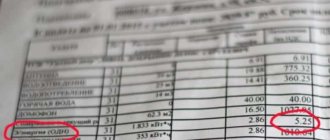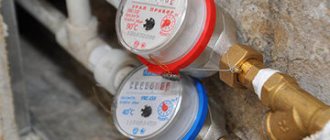Today we are talking about a court case in which the management organization and the RSO found out who, under a direct agreement between the owners and the resource supplier, was obliged to install a common house meter in an apartment building. Read an overview of the court's arguments on the question of whether the UO should be financially responsible for the absence of ODPU in the house.
What the RA needs to know about the installation of common house metering devices
171684
With a direct agreement, the management company pays only for the resources consumed to maintain the common property
An organization managing several apartment buildings in Samara and a cold water supplier entered into a resource supply agreement for the purpose of maintaining the common property of the apartment building. According to the terms of the agreement, the management company paid for excess volumes of CD for SOI, the HVS service was provided to the owners under direct contracts.
In houses where there was no ODPU for cold water, RSO used an increasing factor in the calculations: first 1.4, then 1.5, since the management organization did not provide inspection reports of the apartment building confirming the lack of technical ability to install communal meters.
The management organization did not agree with the calculations, considering that it was not obligated to establish ODPU. Therefore, she cannot be overcharged because of this using odds. RSO filed a lawsuit, demanding to collect from it over 100 thousand rubles of debt for the Kyrgyz Republic on SOI. The companies' dispute went to court.
The UO, responding to the claim of the cold water supplier, noted in its defense that the obligation to install the ODPU lies with the resource supply company as the provider of the utility service for cold water supply. Therefore, RSO cannot calculate fees using increasing factors - there are no metering devices due to the fault of the resource supplier itself.
The court of first instance, considering case No. A55-35227/2017, focused on two issues:
- Who should install ODPU in the house and, accordingly, is responsible for its absence?
- Did RSO have the right to apply a multiplying factor when calculating the payment for CD on SOI?
Can the management authority charge residents an additional fee for replacing the ODPU
10512019
Installation and operation of smart metering devices
From July 1, 2021, electricity suppliers began installing intelligent resource consumption metering systems in multi-apartment and individual residential buildings. Such devices automatically transmit readings and limit the supply of electricity to debtors.
We were asked to clarify who will purchase such smart meters and is there a deadline for completing the replacement of PUs in the old housing stock?
The costs of purchasing and replacing individual counting devices will be included in the tariff. And the PUs in old houses will be replaced as the already installed PUs fail and the verification intervals expire.
When making calculations, RSO has the right to apply increasing coefficients in the absence of ODPU
In accordance with paragraphs. 21 (1), 30 of the Decree of the Government of the Russian Federation dated February 14, 2012 No. 124, RSO determines the amount of resource supplied to the management organization for the purpose of maintaining the common property of an apartment building, taking into account the presence or absence of ODPU and the technical ability to install it.
So, according to paragraphs. “c” clause 21(1) of the RF PP No. 124, if a house does not have a common metering device installed and there is no act that would confirm the inability to install an ODPU, then in 2021 the RSO has the right to apply an increasing factor of 1 when calculating the volume of consumed resources .4, and from 2021 – 1.5. The coefficient is not used from the billing period in which the act on the impossibility of installing a common house meter was drawn up.
The right of the RSO to calculate the volume of CD on SOI using coefficients in the absence of ODPU in the house is also recorded in paragraphs. “g” clause 22 of the RF PP No. 124. This approach, as the court indicated, complies with the norms of Part 2 of Art. 13 No. 261-FZ, stimulating buyers of utility resources to install meters and carry out calculations according to their readings.
RF PP No. 354 and No. 124 also contain conditions on the right of the RSO to apply increasing coefficients when making payments to utility service providers, if the management company/homeowners association has not provided an inspection report of the house confirming the lack of technical ability to establish the DPPU.
The validity of the resource supplier’s use of increasing coefficients was confirmed by the Supreme Court of the Russian Federation in decision No. AKPI16-779 dated October 12, 2016, refusing to recognize the relevant legislative norms as partially ineffective.
Inclusion of the house in the register of licenses
In one of our articles, we talked about a dispute in which the Supreme Court of the Russian Federation did not agree with previous courts and approved the right of a management company to manage a house that is not included in its license. A reader asked for help with his situation.
The State Housing Property Inspectorate, according to Order No. 938/pr, is obliged to make a decision on whether to include or exclude the house from the license. However, the department does not give such a decision. Do you need to go to court?
In this case, you should demand that changes be made to the register of licenses in accordance with Order No. 938/pr: write to the State Housing Inspectorate and the prosecutor’s office so that the latter can understand the situation. We also advised you to contact the Ombudsman for the rights of entrepreneurs in the region. The next step, if these actions do not help, is to go to court.
The MA, as the person responsible for the maintenance of the common property of the house, is obliged to establish the ODPU
The court of first instance also found unfounded the management organization's argument that the obligation to install the ODPU in the house lies not with it, but with the supplier of the relevant utility resources. As the UO argued, it should not be held financially responsible for the inaction of the RSO. It is the water supplier who provides cold water services under direct contracts and must install communal meters.
The judge pointed out to the defendant that, according to paragraphs. “k” clause 11 of the RF PP No. 491, the maintenance of common property includes the installation and commissioning of ODPU, including cold water, and their proper operation.
According to Art. 3 of the Federal Law of July 21, 2007 No. 185-FZ and clause 2.4.2 of Rules No. 170, the installation of ODPU relates to major repairs of apartment buildings and is carried out at the expense of the corresponding fund.
At the same time, the common property must be maintained in a condition that ensures compliance with the requirements of the legislation of the Russian Federation on energy saving and increasing energy efficiency (clause “g”, clause 10 of the RF PP No. 491). The responsibility to ensure compliance with such requirements is assigned to the person responsible for the maintenance of the common property - the organization managing the house.
The court concluded that the MA, by virtue of direct instructions of the law and the management agreement, was obliged to organize the installation and commissioning of the ODPU. In particular, the company could contact RSO and conclude an agreement with it to carry out such work. The cold water supplier's claim was satisfied.
How Resolution No. 897 changed the procedure for interaction between the Authorized Organization and the RSO
356064
Instructions for installing communal metering devices
Until January 1, 2021 (for the Republic of Crimea), all houses must be equipped with common house metering devices. Who is obliged to install them, who will pay for them and, finally, what awaits those who do not comply with the requirements of the law?
For those residents who have not had time to understand the essence of the upcoming innovations provided for by Federal Law No. 261, we are publishing the most common questions and answers to them.
Is the installation of a common house meter mandatory?
Yes, installation of a common house meter is mandatory. According to Federal Law No. 261, payments for energy resources, including water (Article 5, paragraph 2 of the law), must be carried out on the basis of data on their quantitative value, determined using metering devices. The law clearly defines the deadlines for installing energy metering devices: homeowners are required to install a collective metering device before 07/01/12.
Your management company is obliged to notify homeowners about the need and conditions for installing collective metering devices, otherwise it faces a fine for failure to notify the owners.
Do owners of premises in an apartment building need to hold a general meeting to decide on the installation of metering devices?
Yes need. Before starting to organize resource accounting in the house, a collective decision of the owners, adopted by a majority of votes at a general meeting, is necessary.
Who will pay for the purchase and installation of a common house meter?
Since the future metering device will become common property, payment for equipment and work will be entirely distributed among all apartment owners. According to the law on energy saving (Article 13, Part 5), which controls all the nuances of the installation and operation of communal meters, it is the owners who are “ obligated to ensure that their homes are equipped with metering devices
used: water, natural gas, thermal energy, electrical energy, as well as putting installed metering devices into operation .”
This statement is also supported by the Housing Code (Article 158
): “The owner of premises in an apartment building
is obliged to bear the costs of maintaining the premises belonging to him, as well as to participate in the costs of maintaining common property
in an apartment building in proportion to his share in the common ownership of this property by paying a fee for the maintenance and repair of residential premises.”
What options exist for installing common house appliances?
Option 1: Residents independently decide to install a meter
This usually happens in HOAs or in houses with a strong House Council, when residents understand that the requirements of the law cannot be avoided anyway, and realize their benefits from installing a meter. In most cases, these are houses whose general condition is satisfactory, they do not require emergency major repairs of the water supply or electricity systems, and the house already has some money in its account. To do this, the residents of the house convene a meeting, and by a majority vote they make a decision - it must be raised. In this case, the house deducts money from the “current repairs” item.
There are cases (if there is not enough money in the house account), then the owners decide to raise funds for installing a meter in addition to the main payments. In this case, it is also necessary to hold a general meeting and vote on the target fee. If the majority of owners agree, then everyone will have to pay, even those who voted “against”
Residents entrust the HOA or Management Company to implement their decision.
Option 2: The meter is installed at the suggestion of the Management Company
If the residents of the house do not take the initiative to install a common house meter, then the Management Company is obliged to come up with such a proposal.
In accordance with Article 12, paragraph 7 of the Law “On Energy Saving,” the management company is obliged to “regularly (at least once a year) develop and bring to the attention of the owners of premises in an apartment building proposals for energy saving and energy efficiency improvement measures that can be carried out in an apartment building, indicating the costs of their implementation, the amount of expected reduction in energy resources used and the payback period for the proposed measures.”
The management company should facilitate a meeting at which residents will either support the decision to install a meter or refuse it.
As for payment, residents will traditionally be offered to use the money under the heading “routine repairs” or organize additional fundraising. As a rule, management companies offer residents to install a meter in installments.
Option 3: The meter is installed by resource supply organizations
If by 01/01/2019 a common house meter has not been installed, then the companies that supply light, water and heat to our homes will take over. The law obliges them (Article 13, paragraph 9) to “carry out activities related to the installation, replacement, and operation of metering devices
of the energy resources used, the supply or transmission of which they carry out.”
Resource supply organizations will send all management companies and homeowners associations an agreement in which they will offer a metering device suitable for each specific home and will install the meter themselves. Residents and the service organization, for their part, are obliged to provide such a company with access to basements, networks and other objects of common property.
Residents will again have to pay for the metering device - they can pay in installments for up to 5 years. Interest is also added to the total cost of the equipment. Fortunately, by law they should not exceed the refinancing rate of the Central Bank of the Russian Federation in effect on the day of accrual. The owners will no longer be able to refuse the “services” offered. If they do not want to voluntarily pay for the meter and installation costs, utility providers will recover this money through the courts. The law will be on their side.
What penalties are provided for those who ignore the law on the mandatory installation of metering devices?
Legislators foresaw that not all residents would rush to comply with the requirements of the law on energy conservation to install communal meters, so they immediately made changes to the Administrative Code (added Article 9.16), which provided for fines and punishments for those who do not have time to acquire meters on time.
1. Owners are required to pay for the metering device and the costs of the resource supplying organization for its installation. Refusal will result in legal action.
In this case, the owner who loses the claim will also have to pay the company’s costs for legal services.
Art. 13 clause 12 of the law on “Energy Saving”: “In case of refusal to pay expenses on a voluntary basis, a person who has not fulfilled the obligation to equip these facilities with meters for the energy resources used within the prescribed period must also pay the expenses incurred by these organizations in connection with the need for forced collection."









